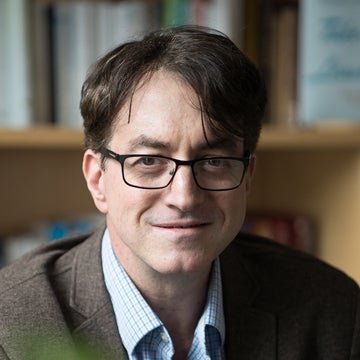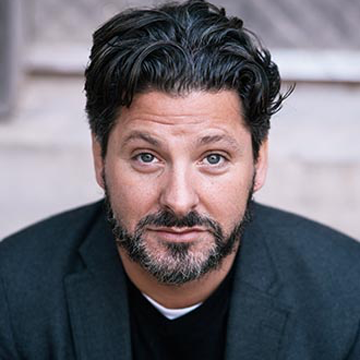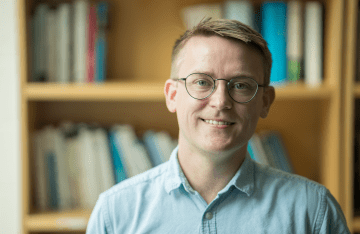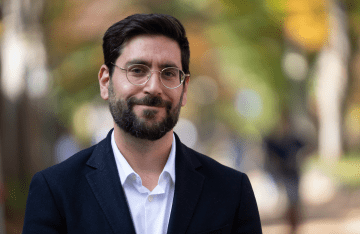Q&A: Victor Pickard and Todd Wolfson on the Media, Inequality, and Change Center
The MIC Center is a joint project of the Annenberg School and Rutgers University's School of Communication and Information.

Photo credit: Maria Oswalt / Unsplash
The wealthiest 1% of Americans own nearly 40% of the nation’s wealth, while the bottom 90% of families hold less than a quarter of it. Fewer and fewer corporations have more and more control over the content of American media. Tech companies like Uber, Postmates, and Caviar are making many people’s lives easier with the push of a button, yet the gig economy workers behind them often struggle to make ends meet.
To explore and address critical problems like these, the Annenberg School for Communication at the University of Pennsylvania and Rutgers University recently teamed up to launch the Media, Inequality, and Change Center (MIC).
Co-directed by Annenberg Associate Professor Victor Pickard and Rutgers Associate Professor Todd Wolfson, MIC will be unique in that not only will it sponsor research around the topics of technology, policy, and social justice, but it also will connect those issues to social movements, partnering with local, national, and international activists to push for solutions to real world social problems. To that end, they will be pursuing grant funding to move ahead as quickly as possible.
Pickard and Wolfson recently spoke with us about the new Center.
What is it about the current moment that makes MIC so urgent now?
Wolfson: Over the last 40 years, we’ve seen growing inequality. The rich have gotten richer and that’s only accelerating. In Philadelphia we feel it, and across the United States and the globe, we see more and more people in desperate straits.
This is coupled with a moment of technological blossoming. Cell phones and other new digital technologies are increasingly abundant, and a lot of people see these tools as our saviors.
Given the combination of our research interests and our shared commitment to addressing inequality and social change as it connects with media and technology, we felt that we needed to create a space where scholarship meets tangible action in the world.
Pickard: I agree, and I would add that today we see a number of historical and structural conditions that create a ripe opportunity and need for a research and activist center like ours.
In recent years we’ve seen growing social movements against structural inequality — ranging from Occupy to Black Lives Matter — and we’re also seeing growing threats to democratic institutions and practices in our current political moment. Drawing from our background as researchers and activists, our center is well positioned to serve as both a policy shop to help guide meaningful interventions, and as a research hub to collaborate with activist groups.
What elements of your own personal research are you bringing to MIC?
Pickard: A lot of my research is focused on the ongoing and worsening journalism crisis. I’m especially interested in studying how misinformation is exacerbated by policy failures and by structural inequalities within our media infrastructures. For example, Sinclair Broadcast Group, which is infamous for pushing an ultra-conservative slant in its news commentary, is accumulating local television stations across the country. I’m also concerned about the growing power of platform monopolies like Facebook and Google over our entire news media apparatus.

One project MIC is planning to do is an assessment of the news media ecosystem in Philadelphia, where — like everywhere else — we’ve seen an overall loss of journalism jobs and growing news gaps. I think it’s important that we start systematically assessing what’s out there, what the unmet needs are, and what can be done to address those inequities.
Wolfson: I’m interested in the gig economy, and some doctoral students and I are doing interviews with Uber and Lyft drivers, and I’ve driven for Uber myself. We’ve begun looking at the most innovative organizing practices of gig economy workers in Europe, where much more of that is going on. We’ll try to launch a project in Philly that’s made up of the best of what’s happening in Europe.
These issues are a growing concern and are deeply entwined with the internet of things, big data, algorithms, etc. We need to understand how these things are shaping the new division of labor and labor processes and determine how workers can alter the dynamics.
How do you plan to bring the activist component to your work?

Wolfson: We want MIC to create tangible effects for and about local community groups trying to make social change. We’re lucky that Philadelphia and New Jersey have a history with social movement contestation in all forms. We are committed to pursuing relationships with local organizations — and potentially national and international groups — and we want to do it in the most thoughtful way possible.
To that end, we’re hosting a conference in the fall that merges scholars and organizers/activists in Philadelphia. We want to discuss the history of organizing and activism in Philly, particularly as it relates to media, and then look to the future.
Pickard: Encapsulated in our name is the recognition that media — media structures, media processes — can both contribute to and help combat inequality. We’re definitely committed to the idea that we can use media to empower activist groups to advance social movements toward social justice. But this also requires a systemic critique of existing media structures, and it requires policy interventions to remake our media system so that it serves democracy, not just corporate interests.
What can we expect from MIC in the coming year?
Pickard: In partnership with the Center for Media at Risk, we’ll be hosting a symposium on the future of the media in the fall. In the spring, we plan on having our formal launch conference.
In addition, we plan on hosting talks and reading groups, and we plan to have graduate students, postdocs, and visiting scholars, all working with us at the center. Researchers and activists are already pitching ideas to us and we plan on issuing a request for proposals in the coming weeks.
This summer MIC will be hosting the COMPASS program, which has been in operation for over a decade and is largely based in Washington, D.C. Since 2012 I have been co-directing this program with USC Professor Mark Lloyd. This year’s cohort includes Graduate Fellows from Rutgers, Penn, USC, Penn State, and the University of Texas at Austin. They will be working with various host institutions, including think tanks, nonprofits, and government agencies, while attending a weekly seminar on media policy.
Wolfson: The center will also host NJ Spark, a project I’ve been running for about three years, funded by the Dodge Foundation in New Jersey. I work with students and teens, and they partner with local community groups to do social justice media work.
Victor and I are trying to imagine new ways of creating media and journalism and then training students to do it. While I think the center will take up a host of things, we’re going to have a particular focus in the next year or two on issues like the gig economy and the future of journalism.
For more information on MIC, please contact program manager Briar Smith.



